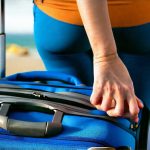Traveling can be an incredibly enriching experience, opening us up to new cultures, sights, and flavors. However, it often disrupts our routines – sleep schedules, exercise habits, and crucially, dietary patterns. These disruptions frequently manifest as changes in bodily functions, including urinary stability. Many travelers return home experiencing increased frequency, urgency, or even incontinence, stemming from dehydration, altered fluid intake (like excessive caffeine or alcohol), and the stress of travel itself. This isn’t necessarily a sign of a serious medical problem, but rather a temporary imbalance that can be addressed through mindful dietary choices post-travel. Understanding how specific foods can help restore urinary stability is key to easing this transition back to normalcy and regaining comfort.
The goal isn’t about restrictive dieting, but about intentional nourishment. It’s about selecting foods that support the bladder and urinary tract, rehydrate effectively, and counteract the effects of travel-induced imbalances. Many common post-travel symptoms—irritability, fatigue, digestive issues—are intertwined with urinary function, making a holistic approach to dietary relief especially effective. This means focusing on foods rich in essential nutrients and avoiding those known irritants while allowing your system time to recalibrate. Ultimately, incorporating targeted food choices can be a simple yet powerful step towards feeling like yourself again after being away.
Rehydrating & Supporting the Urinary Tract
Proper hydration is arguably the most crucial element of post-travel urinary stability. Travel often leads to dehydration due to dry cabin air, increased physical activity, and sometimes, limited access to clean drinking water. Simply drinking more isn’t always enough; we need to focus on optimal rehydration strategies. Water should be your primary choice, but incorporating hydrating foods is also incredibly beneficial. Think cucumbers, watermelon, celery, and even soups – these contribute to fluid intake while offering additional nutrients. Electrolyte imbalances, common after travel (especially air travel), can exacerbate urinary issues, so consider natural sources like coconut water or a pinch of sea salt in your water.
Beyond water, certain herbal teas can be supportive. Dandelion leaf tea is a mild diuretic that can help flush the urinary tract without being overly harsh, while chamomile tea offers calming properties that may reduce bladder urgency associated with stress. Avoid caffeinated beverages and excessive amounts of alcohol initially, as these are known bladder irritants. Focus instead on restoring balance by prioritizing consistent hydration throughout the day rather than large volumes at once. This gradual approach allows your kidneys and bladder to regulate more effectively.
Finally, foods containing natural diuretics can gently support urinary function. Asparagus, parsley, and ginger have mild diuretic properties, encouraging healthy fluid elimination without causing irritation. These should be incorporated as part of a balanced diet, rather than consumed in excessive quantities. The key is gentle support, not aggressive flushing. Remember that individual tolerance levels vary, so listen to your body’s cues. You can also explore how to add vitamin-rich foods – https://urologyinform.com/how-to-add-vitamin-rich-foods-without-irritants/ – without exacerbating sensitivity.
Foods to Soothe Bladder Irritation
A significant component of post-travel urinary instability often stems from bladder irritation. Travel can introduce new foods and drinks (or changes in consumption) that trigger sensitivity. Identifying and minimizing these triggers is essential for restoring comfort. – Prioritize bland, easily digestible foods initially. – Avoid acidic fruits like citrus fruits and tomatoes, which can irritate the bladder lining. – Limit spicy foods, chocolate, and artificial sweeteners, all of which are common culprits for increased urgency.
Focusing on soothing options is equally important. Bananas are rich in potassium, which helps regulate fluid balance and may reduce bladder spasms. Blueberries contain compounds that have been shown to potentially strengthen the pelvic floor muscles (although more research is needed). Oatmeal provides a gentle source of fiber and can help regulate bowel movements, reducing pressure on the bladder. These foods offer not only nutritional benefits but also contribute to a calmer digestive system, indirectly supporting urinary stability. Consider tracking potential triggers with a food journal – https://urologyinform.com/how-to-identify-foods-that-trigger-urinary-discomfort/ – to pinpoint sensitivities.
A crucial step in managing bladder irritation is food journaling. Track what you eat and drink alongside any changes in your urinary symptoms. This helps identify potential triggers that you can then eliminate or reduce from your diet. It’s important to remember this isn’t about permanent restriction; it’s about understanding your body’s sensitivities and making informed choices.
The Role of Fiber & Gut Health
The connection between gut health and urinary function is increasingly recognized. A healthy gut microbiome plays a vital role in overall inflammation levels, which can directly impact bladder sensitivity. Travel often disrupts the gut microbiome due to changes in diet, stress, and potential exposure to new bacteria. Incorporating fiber-rich foods post-travel helps restore a healthy balance. – Soluble fiber, found in oats, applesauce, and bananas, absorbs water and promotes regular bowel movements, reducing pressure on the bladder. – Insoluble fiber, found in whole grains and vegetables, adds bulk to stool and aids digestion.
Probiotic-rich foods are equally important for rebuilding gut flora. Yogurt with live cultures, kefir, sauerkraut (unpasteurized), and kimchi can all contribute to a healthier microbiome. A balanced gut reduces inflammation throughout the body, potentially lessening bladder irritation and improving overall urinary function. Remember that introducing probiotics gradually is best to avoid digestive upset. Supporting your gut health can also mean exploring daily additions – https://urologyinform.com/daily-additions-to-strengthen-urinary-immunity/ – to bolster overall wellness.
Beyond specific foods, adequate hydration further supports gut health by keeping stool soft and promoting regular bowel movements. This holistic approach – combining fiber-rich foods with probiotic sources and sufficient hydration – offers a powerful strategy for restoring both gut and bladder stability after travel.
Rebuilding Electrolyte Balance
As mentioned earlier, electrolyte imbalances are common post-travel, particularly after flying. These imbalances can significantly impact urinary function, leading to increased frequency or urgency. Sodium, potassium, magnesium, and calcium all play crucial roles in maintaining fluid balance and nerve function. Travel disrupts these levels through dehydration, altered diets, and the physiological stress of being in a different environment.
Replenishing electrolytes doesn’t necessarily require sports drinks filled with sugar and artificial ingredients. Natural sources are far more effective and beneficial. Coconut water is an excellent source of potassium and electrolytes. Bananas are also rich in potassium. Leafy green vegetables provide magnesium, while dairy products (or fortified plant-based alternatives) offer calcium. A pinch of sea salt in your water can help replenish sodium levels.
It’s important to avoid excessive intake of any single electrolyte; balance is key. Overdoing electrolytes can actually worsen symptoms or create new imbalances. Instead, focus on a well-rounded diet that incorporates these natural sources consistently over several days. Listen to your body and adjust your intake based on how you feel. If you suspect significant electrolyte depletion, consult with a healthcare professional for personalized guidance. To further support recovery, consider incorporating calming practices like breathwork – https://urologyinform.com/using-breathwork-to-reduce-urinary-frequency/ – to manage stress and restore balance.





















